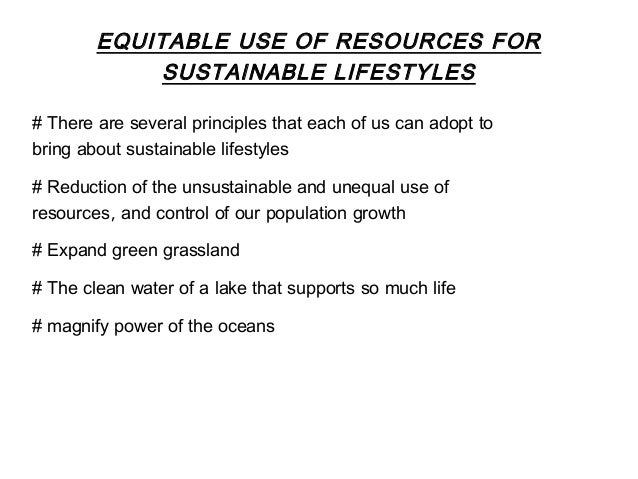Equitable use of resources for sustainable lifestyles
Scarcity of resources is the burning problem of modern technology. The twenty-first century will see growing human needs for resources since many parts of the world are using natural resources at a rate faster than the natural processes can replenish it.

Natural resources are limited. For example, the existing water sources are being subjected to heavy pollution. Global climatic changes are altering the quality of fresh water sources as a consequence of unknown effects on the hydrological cycle.
Sustainable development is currently being discussed as a focal theme in the field of development, planning and other associated aspects. In the light of self-defeating current mode of development and recurrent natural calamities, people are urged to ponder over the faults, shortcomings, lacunae, discrepancies and limitations of the ongoing developmental process and production system.
It is essential to sustain the natural resources. We should conserve natural resources so that it may yield sustainable benefit to the present generation while maintaining its potential to meet the needs of the future generation. There are three specific objectives to conserve living resources:
1. To ensure that any utilisation of the ecosystem is sustainable.
2. To preserve biodiversity and
3. To maintain essential ecological processes.
Resource management should be less energy-intensive, suitable to local ecology and needs of the people, less cost-intensive and more viable in terms of economy, ecology and culture. The Srilankan team, for example studied traditional paddy irrigation systems as a model for water management.
Its reports note that from the 5th century B.C. through the 12th century A.D., Sri Lanka developed a technologically advanced civilization based on an intricate system of rainwater conservation and irrigation. Water users were collectively and individually responsible for maintenance of the irrigation systems and customary laws, known as Sirit, were established governing water use and related aspects of life.
Similarly, the italics system is a system of farmer-managed canal irrigation, which has been in operation for more than 300 years in Dhule, and Nasik district of northwestern Maharashtra.

